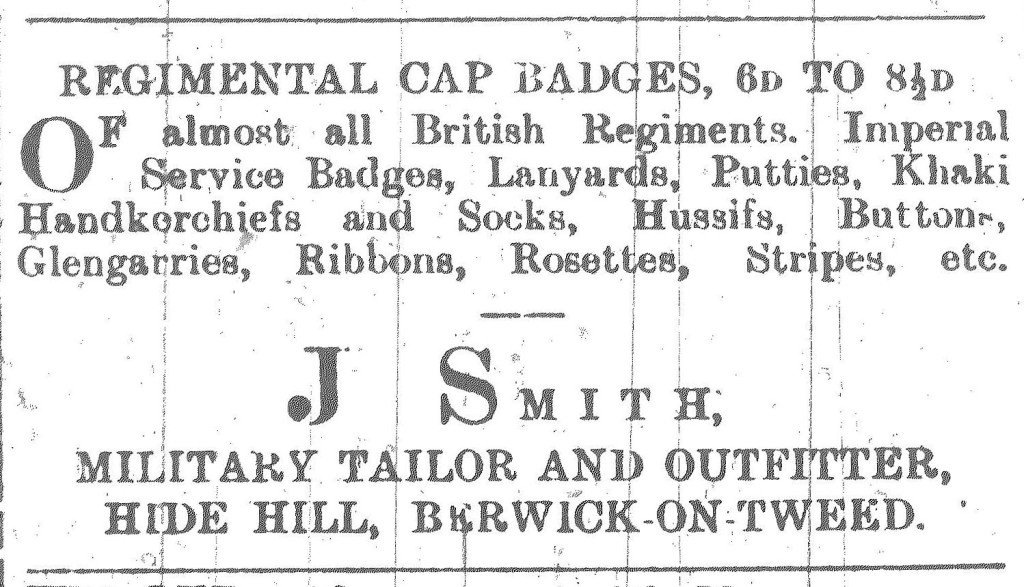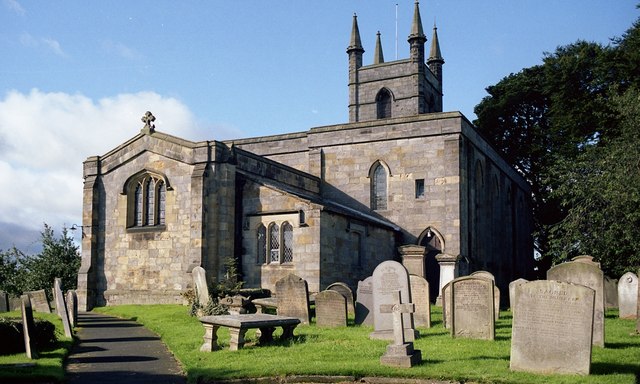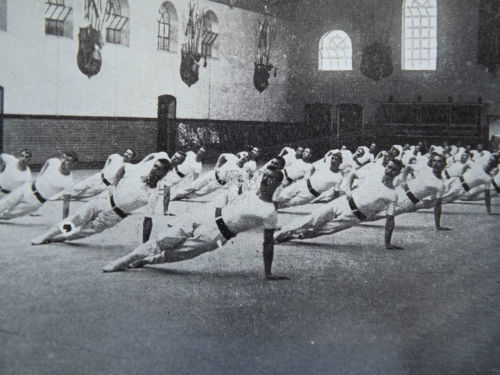
BERWICK TOWN COUNCIL
The members then sat as a Town Council, Mr W. J. Bolam, Land Steward, being also present.
THE WAR MEMORIAL
The Clerk submitted the resolution regarding the War Memorial for Berwick, forwarded from the public meeting last week, in the name of the Mayor as Chairman, and delegating the question of a Memorial to the Town Council.
The Mayor said he was very grieved and very sorry at the termination of the War Memorial Committee. After the meeting last week he had determined not to let one hour pass till the matter was taken up again. It was up to those of us who had been kept in safety to erect a worthy Memorial to the men who had fallen. He moved that the Berwick Aldermen and Councillors be formed into a Committee with powers to add to their numbers, and take the work in hand. Councillor Darling seconded.
Mr Brewis, who thought at first that the Mayor’s motion was that the Town Council should take up the work of the War Memorial Committee and set up a Committee of its own for the purpose, said that it was no part of the duties of the Town Council to take over the management and disposal of voluntary subscriptions to a War Memorial. Last week’s meeting was held for subscribers only, and only 32 out of 1100 attended. No wonder Dr Mackay was bitterly disappointed. So would be every Berwick man who fought in the war. Berwick had failed where Tweedmouth and Spittal had succeeded. The Berwick War Memorial Committee should have had an alternative scheme ready, because they could not know that the ratepayers would agree to the removal of the Scotsgate. The ratepayers so far as he had been able to ascertain were against its removal, and against the rates being used for Memorial purposes. He knew of no other Town Council that had been requested to take over the work of a War Memorial Committee, and as he had stated, they were under no legal obligation to do so, and certainly under no moral obligation. The work of the Council was quite onerous enough already. At the meeting of subscribers on Wednesday last of the 32 who attended, 11 voted for the Town Council to take the Memorial in hand, and 9 against, leaving 12 who did not vote at all. Could the Mayor tell him if those 12 subscribers wished the Scotsgate removed or not, because one of the principal speakers at the meeting had asked him (Mr Brewis) months ago to strongly oppose its removal?
The Mayor – I am not in a position at the present time to answer that question.
Councillor Campbell – What was the spirit in which the motion was sent?
The Mayor – I am not answerable for the motives of other people.
Councillor Campbell maintained that the contentious spirit shown at the War Memorial meeting was not right. Col. Mackay had shown a different spirit.The handing over of the Memorial question to the Council was an endeavour to exploit the Council, who did not carry the Committee’s scheme to take down the Scotsgate. They were throwing the onus on the Town Council. He considered this was a matter for the subscribers. The Council had enough in hand already. As regards his own position, as his term of office expired shortly, he did not consider he was justified in becoming a member of the proposed new Committee. The decision of the War Memorial meeting of a majority of 2 on a vote of 20, was unfortunate.
Ald. Short stated there had been immense difficulties in the question of a Memorial for Berwick. Feeling had reached a rather high point. He considered the Mayor had had no alternative but to make the suggestion he did. The motion met with his (Alderman Short’s approval, but he suggested they ought to go further and take in the whole Town Council. They were all equally sorry for the loss of the men, and would all subscribe. If by becoming a subscriber they were qualified to be on the Committee he for one would certainly qualify. There had been 40 men on the Tweedmouth Committee, and everything had been very harmonious. He hoped they would all go heart and soul into the matter, and work as hard as they could to erect some worthy Memorial to the men who gave their lives.
Councillor Brewis stated there was no question of wishing to have the best Memorial. We were all at one about that (Hear, Hear).
Councillor Blench suggested that the Council join the other Committee, and work along with them, not to take the responsibility on their own shoulders.
Councillor Brewis – There is no other Committee.
Councillor Blench thought that if the suggestion was put before the old Committee they would agree. They were all anxious to complete the Memorial. If it had not been for the men who gave their lives, there would have been no Scotsgate, no Berwick standing today.
The Mayor drew attention to the fact that his motion did not confine the matter to the Council.
Councillor Dixon suggested that the Mayor had made his motion to get out of a difficulty. He thought the old Committee might be called together by invitation.
Councillor Darling stated in seconding the Mayor’s motion, his idea had been that the Council would form a nucleus to make a fresh start.
Councillor Brewis – That is not the application made.
The Mayor – We are not here to discuss the application but to find out the best way to erect the Memorial.
Councillor Wilson stated that there was no question that the mover of the motion at the Memorial meeting and his supporters meant the Town Council to take over the whole matter of the War Memorial. Personally he quite approved of the Mayor’s motion. But that was not the intention of the meeting. The Mayor had taken a wise path. This question of a Memorial should be above squabble. (Hear, hear.) It was far too delicate and solemn a matter. He suggested that the men and women be asked to help in this matter. He regretted the lack of tone at the Memorial meeting. (The Mayor- We all felt that). He thought the Council should not put their responsibility to one side, but shoulder it and make the Memorial a success.
Councillor Brewis pointed out that the whole of the members had come there that night with the same interpretation of the action of the Memorial meeting.
The Mayor – We are here to take steps to carry on the Memorial, not to do as someone else tells us.
The motion was unanimously agreed to.
LOCAL NEWS
On Thursday morning last an accident occurred on the Old Bridge about 10.15 a.m. Two large motor wagons belonging to Messrs Johnson and Darling, and to Messrs Spring, fish curers, Berwick and Hull, colliding. There was very little damage done, but traffic was delayed for a short while.

On the afternoon of the same day, while a woman was wheeling a perambulator across the Bridge, a pony and trap passing knocked the perambulator over, upsetting the two children in it. Fortunately the children were little the worse. The most regrettable part of the incident was that the party driving the trap did not consider it worth while to stop and enquire what damage had been done. On Friday two motor lorries again collided on the Bridge one of them having been in the smash the previous day.
BERWICK SANITARY AUTHORITY
Ald. Richardson drew attention to the absence of a urinal and a water closet at the Carr Rock. In those days when men came from all parts with herring boats, he thought it was the duty of the Authority to put this matter right at once.
The Mayor pointed out that the proper course for Ald. Richardson to have followed regarding this matter, was to have sent a complaint to the Town Clerk. The question could then have been put on the agenda. Otherwise time was put off, and members did not know what was coming before them. The matter was referred to the Works Committee with powers.

Ald. Short asked how it was that for days there had been no water in the urinals and closets in Tweedmouth. People had come into his office complaining that the closets were dry.
The Surveyor stated that was the first he had heard of it. A man was paid to look after these things, and he had heard nothing from the man.
Councillor Edminson – Why do not the officials go themselves and see about it? There are a great many abuses that are not attended to? With all the officials Berwick should have been a little Paradise by now.
Ald. Short – The Surveyor is seldom in Tweedmouth to my knowledge. It is a very hazy recollection I have of seeing him the last time.


















